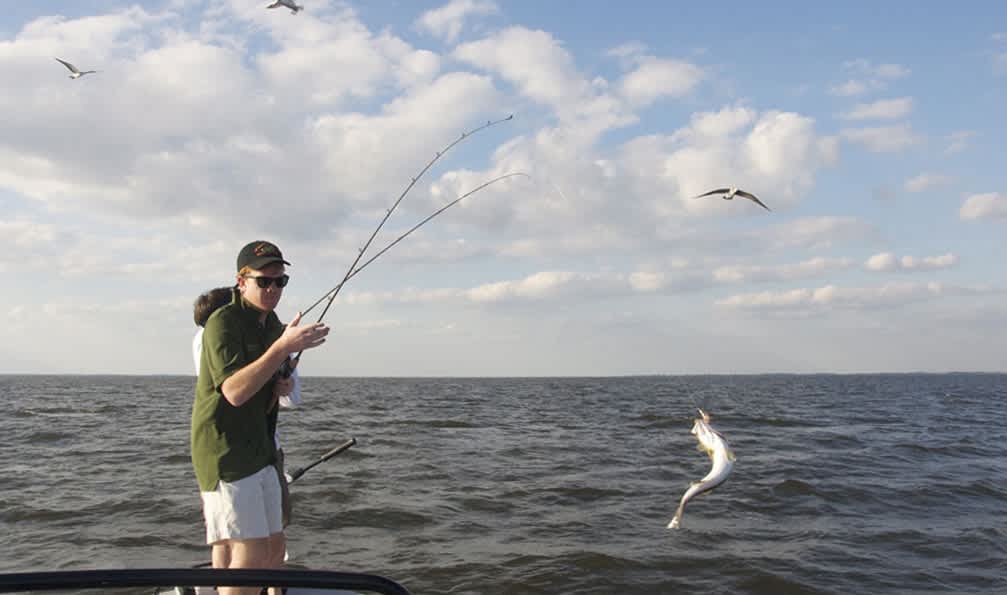Louisiana: The Sportsman’s Paradise, Part One
Josh Wolfe 11.14.13

I am here to tell you that quite recently a very outstanding question has been answered for me, one that has eluded me for some time, and ultimately, one that I had to just go out and discover for myself: Why is Louisiana the sportsman’s paradise?
My initial reason for heading to Lake Charles was to attend the Southeastern Outdoor Press Association’s (SEOPA) conference, which I did. But when I found out that I could incorporate some fishing into the trip, I literally jumped on board.
I landed in Lake Charles, having just arrived from an elk hunt in New Mexico, on a beautiful Thursday afternoon. When I say “beautiful,” I mean there wasn’t a cloud in the sky, the temperature moderate, and most importantly, not a flash of wind. My friend Cole Henry, of the Congressional Sportsmen’s Foundation (CSF), picked me up at the airport and we headed straight to the water where we met Bryan Williams, who was to be our guide for the day.
Bryan is not actually a guide, you see. No, he is a friend of Jeff Angers, who sits on the board of the CSF. And it wasn’t long after our introduction that the three of us became friends. Cole had lined up the trip with Bryan a week or two in advance. I got the invite only a few days before. Turn down a fishing trip when I could be working instead? Let’s move on…

Like I mentioned, there was not a bit of wind. The water was glass-smooth, a slalom skier’s dream. Bryan rocketed his boat out of Calcasieu Point Marina and out onto the lake of the same name. In his emails he had mentioned something along the lines of “fishing the birds” and “Oregon Ducks offense.” I had read them quickly as I was boarding a plane and took him to just be a disoriented Oregon fan living in Cajun country. Au contraire.
“We’ll watch for flocks of sea gulls hovering over the water,” he began. “The shrimp have recently moved into the lake, the more shallow water, and schools of speckled trout will be gorging themselves. And when the birds see shrimp skipping across the top of the water, well, you better hold on because that’s where we’re going. Run and gun! Just like the Oregon offense.”
He wasn’t joking. We immediately saw a large group of gulls hovering over the water several hundred yards out in the middle of the lake and he hammered the throttle. Cutting the engine a hundred yards from the avian foray, Bryan lowered the big, 150-pound thrust trolling motor into the water. We each took a bait-caster in hand with a shrimp-colored jig on the end of the line.
“I’m going to try to keep the boat parallel to the school so we can all cast,” Bryan said.
Good enough. We began putting fish in the cooler right away. Nice speckled trout, most in the 15- to 20-inch range. At one point I put a flounder in the boat.
“Only a redfish away from the Calcasieu slam,” our new friend said with a high five.

We hit a few more spots where fish were once prevalent, but it was apparent that many anglers also new about the honey holes that Bryan once frequented. Even though we caught a few fish on our own, the best action was always below the birds.
We fished the afternoon away, putting a near-limit in the cooler before heading back to the dock to beat the sunset and clean our catch. After the delicious white meat was peeled away and bagged, rods and boat cleaned, and gear re-stowed, we followed Bryan to his house. He would guide us on just one more trip before heading back to the hotel.
“Y’all ever had a good po’ boy?” he asked with a smirk. “I mean a sure enough good po’ boy?” he reiterated.
“Well, yeah, kind of, I don’t know.”
“Follow me.”
We jumped back in Cole’s rental car and headed off to one of Lake Charles, Louisiana’s prized watering holes, which also happened to have a few items on the menu, namely po’ boys. We toasted our luck on the water and newly found friendships with good Abita beer and shrimp po’ boys bigger than any fish we’d caught that day.
So, now you’re probably wondering how I found the answer to the aforementioned question. Well, I was lucky enough to be in Louisiana for several days on that trip. And the adventures go beyond good fishing, po’ boys, and cold beer. I discovered a place where conservation takes on a new meaning, where people are unselfishly working their tails off for the sake of the land and animals they love, which I’ll explain the best I can real soon.
Click here to read part two of this story.

